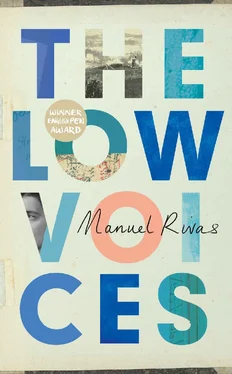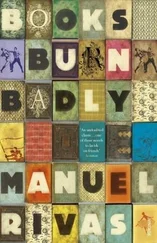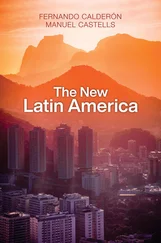‘Cymbals, Manuel! Let the wonders of the world ignite!’
When he was working near home, I would take him his lunch in an earthenware pot with the lid tied down by a strip of tyre. They almost always kept a bonfire going on site, from which they would remove some embers to heat the pot. That fire had a special smell. A fire on site smells of the building site. They generally use bits of plank from the moulds. Damp, covered in lumps of cement. Fire doesn’t like them. It starts emitting smoke. What keeps the flames going, what revives them and gives them meaning, is the thick paper from the sacks of cement. The flames rise and fall sulkily. It’s important the way the paper, splinters and planks are positioned. A pyramid with the correct amount of air flowing through it. But this reticence makes the flames more long-lasting. It’s a fire that’s difficult to put out, even if it’s raining. When it was very cold, they would build a primitive stove, burning sawdust in a metal drum that was also used for preparing whitewash. I liked the smell of the building site. The fragrance of cold, hard, headstrong materials. Until the structure had been built, the materials would occupy the site with a sullen identity. The heap of sand smelled of the sea. In those days, they fetched sand from the beaches or dunes. It had to be sieved. What filtered through was fine sand like flour. What didn’t filter through were crumbs of the sea’s memory, bits of shell, of sea urchin, a crab’s pincer. On the lookout and bad-tempered, the iron, wood, bricks, blocks, asbestos, tiles, slates. This is why the bonfire was important, however poor it might be. It was like a sign or an ownerless dog that refused to budge from the empty site. After two or three weeks, everything was different, the materials had adopted a different disposition. A state of cheerfulness. The bricks weighed less. The pulley wheels squeaked. The spirit level and plumb line legislated over the void.

The author’s father on the left
When it comes to building, there are jobs that are imbued with a certain aura. The job of painter, for example. My father could immediately tell who the carpenter, electrician or plumber was. He had no problem identifying the painter. It was obvious from the haircut, the shirt, the style. What about the builder? The builder is the one who puts everything together where there was nothing before, the one who places the laurel on top. There’s a roof, a house. But there’s something wrong with being a builder.
‘Become a painter. They sing on site. They’re good to work with. And they wear shirts that give off light.’
Xosé used to laugh at this business with the shirts. Perhaps that was the problem with builders. They didn’t dare put on a loud shirt. I wanted to be a lorry driver. I had great admiration for a friend of my father, Jorge from Palavea. He used to wear bright shirts as well. But when the lorry broke down, he would remove his shirt and slide under the machine with a naked torso. He didn’t come out until he’d fixed it. He referred to his lorry as a large, strong, good, but slightly deranged animal. Which broke down for the most absurd reasons. Once, after hours of fishing around, he came out from under the lorry, complaining vociferously, and showed me a steel ball bearing. Glinting in the sun. See this? It had a black spot, like a tiny amount of decay on the enamel of a tooth.
He was sweaty. Grimy. He stared at the lorry’s snout in dismay. The way they behaved, they resembled each other more and more closely.
‘That’s the reason it stopped. Do you find that normal?’
The way they related to their tools. This was another detail that caught my attention whenever I visited the site and observed Xosé and my father. They felt a responsibility towards them, which they never shirked. The day only came to a close when they’d cleaned and washed the tools. They did this meticulously, leaving not a single stain. Their hands would grow soft, pale, all wrinkled, like skinless creatures, while the tools would regain a modest splendour and lie down in a resting position, as in a dormitory. Until tomorrow.
In some part of my brain, in the secret Department of Essential Information, is the day my father explained to me the purpose of a plumb line and, in particular, of the air bubble in the tube of a spirit level. The house is supported by the air bubble, that one right there. The bubble sees a lot better than your eye. The bubble has information about terrestrial coordinates, meridians and parallels. The bubble corrects your eye. It is not deceived. It is always sincere. Put up a wall, and you think you’re doing a great job, but the bubble in the spirit level may come along and tell you you’re not, it’s not straight, however much you think the opposite. And it’s the bubble that’s right.
The bubble in a spirit level, that drop of intelligent emptiness, has exercised a hypnotic attraction over my eye ever since. The immediate reflex of checking the level, or lack thereof, in the objects around it. Tools were the best toys we children had. The idea of making a boat wasn’t an imaginary intention. We could give it a go — and we did. We had wood, we had tools. And the sea wasn’t far away. An excess of nails brought about our failure on the first day. In the end, however, the problem was financial, not naval. If we wanted to go hunting for treasure in Castro, we had mattocks, pickaxes and shovels. And we went. It wasn’t a joke. Torques had turned up together with a beautiful Celtic diadem with triskeles and a clasp in the shape of a golden duck, that emigrant from here to the beyond. The trouble was, as Pepe de Amaro explained to us on our return from digging, defeated, that it’s not you who finds the treasures, it’s the treasures that come looking for you. The truth is we children in Castro liked tools almost as much as football. Not to work with, of course, just to play at working.
Access to our house was not that easy. The water supply was a public fountain in the grounds of the vicarage, where there was also a place for washing. But the supply was intermittent, given the character of the parish priest, who was somewhat feudal, not to say Neolithic. So there was an important problem. My father went searching for an essential treasure: water. The house was on a hillside, and he dug a well, convinced a spring would soon appear. He dug and dug. He came across granite and fought bravely against the stone with a mallet, iron wedges and even dynamite. It was unbelievable: there was water everywhere except in that well. While he went exploring in different parts of the property, the water would rise to the surface on the floor of our house, in the most hidden corner, under the beds, with effervescent irony. The house was located under a kind of atmospheric passage in the north-west of the peninsula, which is where the most powerful formations of Atlantic clouds came in. This wasn’t a subjective impression. It was what the Weatherman said, with his Stick in the Atmosphere.
The first time I met the figure of the Weatherman was when we were able to watch television in Leonor’s pub. This Mariano Medina — that was his name — seemed like a nice enough guy, I have no doubt. All the customers, who normally ignored the news, would be all ears whenever Medina appeared, his sobriety emphasised by thick glasses and the stick for indicating isobars. The weather maps back then were not in colour. Everything was either black or white. After a short discussion about high and low pressure, the pointer would invariably gravitate, with inclement insistence, towards Castro de Elviña and, more specifically, towards the roof of our house, in order to announce the approach of the Azores cyclone. This atmospheric phenomenon, with its boxer’s name, was always punctual. It would unleash seas of water that flooded everything — except for the well my father was digging.
Читать дальше













